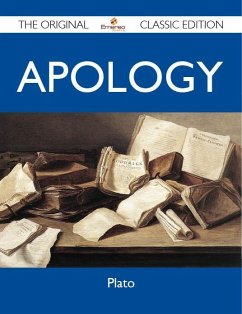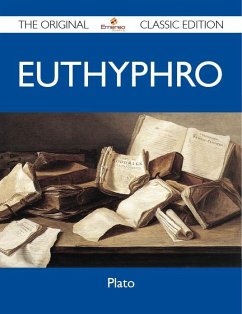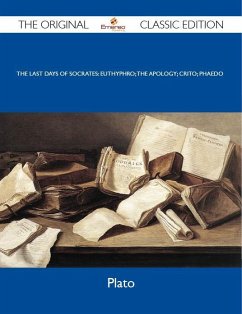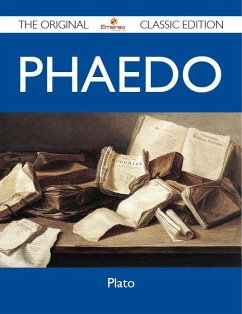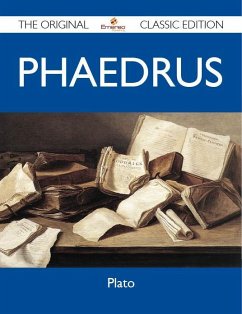Apology is Platos least philosophical and most unrepresentative work but arguably his most important and is among many readers favorites, including mine. However, the fact that it is widely anthologized -- e.g., in The Trial and Death of Socrates -- makes it hard to justify a standalone, but some may be taken by the translation.
The work purports to be Socrates self-defense at his trial. It is historically priceless if so, as it gives his last public statements and some background about his life and the lead up to the trial. Even if not, it is of immense worth as a passionate, sound defense of individualism and free speech; its timeless evocation of these all-important concepts is forever associated with Socrates and the main reason he has been immortalized. The work also piercingly examines the often vast law/conscience gap and is thus an early higher law document. Finally, it is a sort of mini-dialogue in itself touching on and in several ways tying up classic Socrates/Plato themes like the nature of piety and goodness, responsibility toward the gods and the state, interpersonal relations, and life vs. death issues. It sums up Socrates and perhaps Plato better than any other work.
The ever-important translation issue must also be kept in mind. It goes without saying that anyone who cares about intellectual issues, especially applied ones, must know Plato, as should anyone who wants to be even basically well-read. However, this is far easier said than done for most; he is so different from what now passes for literature, to say nothing of pop culture, that he is virtually inaccessible to general readers. Yet the importance of persevering cannot be overemphasized; the payoff is well worth the effort. As nearly always in such cases, reading him becomes far easier after the initial difficulty; no attentive reader will ever think Plato easy reading, but he is utterly absorbing once we get used to his style. He has a near-poetic beauty that all agree has never even been remotely approached in philosophy, and such mesmerizing prose is rare in any genre. His dialogues are an incredible form at once intellectually and aesthetically pleasing - an inspired combination that has perhaps never been bettered; many have appropriated it, but none have matched it. All this means that picking the right translation is probably more important with Plato than any other writer. For the average reader, the more recent, the better is generally true, but older translations like W. H. D. Rouses and Benjamin Jowetts are still very accessible. The important thing is to read Plato in some form, and those who happen on a translation that does not work for them should keep trying until their mind opens in a truly new way - and once done, it will never close again.
The work purports to be Socrates self-defense at his trial. It is historically priceless if so, as it gives his last public statements and some background about his life and the lead up to the trial. Even if not, it is of immense worth as a passionate, sound defense of individualism and free speech; its timeless evocation of these all-important concepts is forever associated with Socrates and the main reason he has been immortalized. The work also piercingly examines the often vast law/conscience gap and is thus an early higher law document. Finally, it is a sort of mini-dialogue in itself touching on and in several ways tying up classic Socrates/Plato themes like the nature of piety and goodness, responsibility toward the gods and the state, interpersonal relations, and life vs. death issues. It sums up Socrates and perhaps Plato better than any other work.
The ever-important translation issue must also be kept in mind. It goes without saying that anyone who cares about intellectual issues, especially applied ones, must know Plato, as should anyone who wants to be even basically well-read. However, this is far easier said than done for most; he is so different from what now passes for literature, to say nothing of pop culture, that he is virtually inaccessible to general readers. Yet the importance of persevering cannot be overemphasized; the payoff is well worth the effort. As nearly always in such cases, reading him becomes far easier after the initial difficulty; no attentive reader will ever think Plato easy reading, but he is utterly absorbing once we get used to his style. He has a near-poetic beauty that all agree has never even been remotely approached in philosophy, and such mesmerizing prose is rare in any genre. His dialogues are an incredible form at once intellectually and aesthetically pleasing - an inspired combination that has perhaps never been bettered; many have appropriated it, but none have matched it. All this means that picking the right translation is probably more important with Plato than any other writer. For the average reader, the more recent, the better is generally true, but older translations like W. H. D. Rouses and Benjamin Jowetts are still very accessible. The important thing is to read Plato in some form, and those who happen on a translation that does not work for them should keep trying until their mind opens in a truly new way - and once done, it will never close again.
Dieser Download kann aus rechtlichen Gründen nur mit Rechnungsadresse in A, D ausgeliefert werden.

